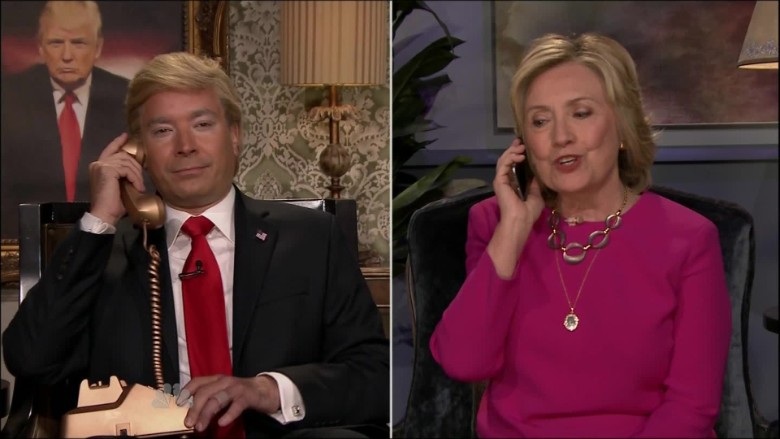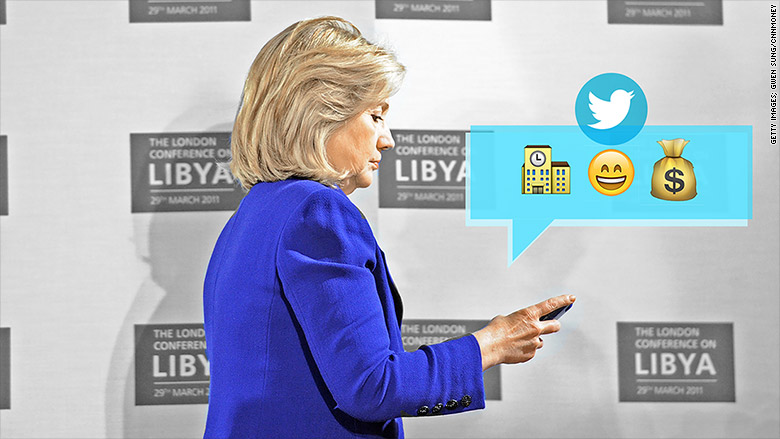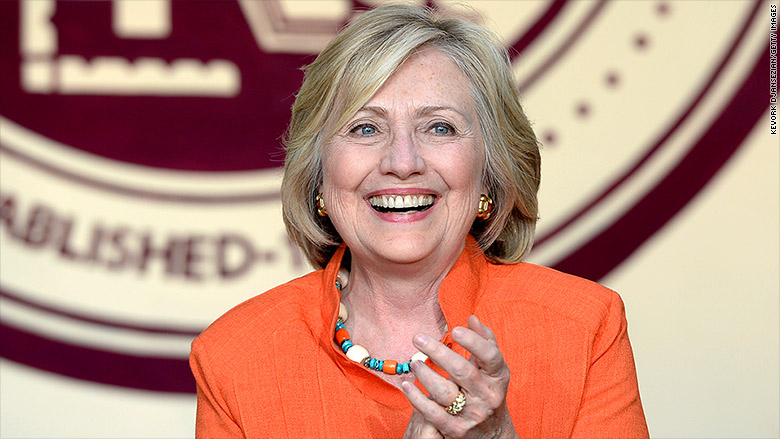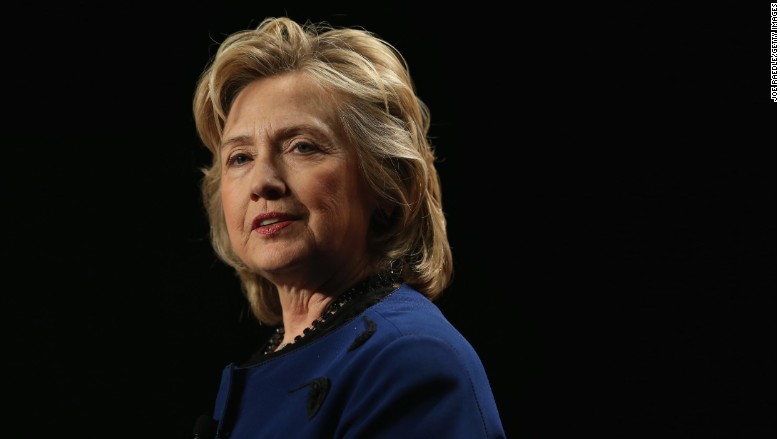
Hillary Clinton is at pains to convince Americans that she is a real person.
Last week, she invited Jimmy Fallon to touch her hair. On Sunday, when asked to describe the "real Hillary Clinton," she replied: "Look, I am a real person."
Despite two-and-a-half decades in the public eye, Clinton is still trying to convince American voters that she is real, authentic and, yes, likable. Nothing is standing in the way of that goal so much as the candidate herself, Democratic strategists and political journalists say, which could pose a real problem if Clinton is forced to face a spirited Republican candidate like Marco Rubio or Carly Fiorina, or a dynamic Democratic challenger like Joe Biden.
"She does not like to open up, she does not like to be exposed, she doesn't like to subject herself to the navel-gazing that presidential politics requires," David Axelrod, the chief strategist for Barack Obama's presidential campaigns, told CNN. "People want dimensionality. They want to know what motivates you, what makes you tick... presidential races are like MRIs for the soul, and I don't think she likes that part of the process."
No one doubts the extent of Clinton's political experience. Many attest to her retail strengths in Iowa and New Hampshire. But when she sits down with a national news outlet and the cameras start rolling, Clinton often comes off scripted and stilted -- a stark contrast to the cool affability of current and previous Democratic presidents.
Related: Hillary Clinton and fake Donald Trump appear on Jimmy Fallon's show
"We're in an age where likability is key," said April Ryan, the White House correspondent who recently interviewed Clinton for American Urban Radio Networks. "She is not Bill Clinton. She is not Barack Obama. She is not your typical politician."
Presidential politics has always been a contest where "likability" and ""authenticity" matter, but in the 2016 cycle they have become downright paramount. There is a widespread desire -- reflected in the rise of Bernie Sanders and Donald Trump -- for candidates who project a genuine enthusiasm and appear comfortable in their own skin. Clinton achieves this in person, many strategists say, but often fails to bring it through on camera.

Even James Carville, the fiercest of Clinton's defenders, concedes that sit-down interviews don't necessarily play to the candidate's strengths.
"'I'm not sure that the longform interview is her best venue, but so what," Carville, the lead strategist for Bill Clinton's 1992 presidential campaign, told CNN. "It's pretty early. There's a lot of green between here and there."
Nick Merrill, the Clinton campaign press secretary, declined to comment for this piece.
Related: Hillary Clinton tweet crushes biotech stocks
Part of Clinton's challenge is that she is far more interested in policy than politics -- which many supporters might argue is a good thing. It was certainly an asset during her tenure as senator of New York and as Secretary of State. But while policy might appeal to wonks and Washington insiders, it often bores voters.
"Clinton had an incredible relationship with State Department reporters because they share her interest in the details and substance of policy issues," said Tommy Vietor, the former Obama administration National Security Council spokesperson. "Political campaigns -- and I don't think I'm offending members of the press when I say this -- are about a lot of trivial garbage at times. ... When she's allowed to talk about serious things, she's incredibly good at it. Her passion comes through. For a lot of candidates who are forced to talk about polls or whatever stupid thing Donald Trump just said -- it gets old."
Nevertheless, Clinton has made an aggressive effort to appear more human in recent weeks. She's opening up. She's cracking jokes about Donald Trump. And she's laughing more -- a lot more. Her appearance on Jimmy Fallon's show last week was her best performance to date, several strategists and reporters said. Her interview with CBS' "Face The Nation" was more seamless than previous sit-downs with CNN's Brianna Keilar or ABC's Diane Sawyer.

But the road to a more open and authentic Clinton was long. It wasn't until three months into her campaign that she even sat down for a national interview. At the time, the campaign promised that more interviews would be forthcoming, but after a poor showing -- "I didn't hear a more open or transparent Hillary Clinton," CNN's Keilar said after the interview -- Clinton reneged. Her next English-language interview (she did a Spanish-language interview with Univision) wouldn't come til nearly two months later.
The stilted interview schedule reflected Clinton's dislike of interviews and suspicion of the press, strategists and reporters said. Clinton has spent nearly 25 years in the public eye, much of it dealing with relentless media coverage focused on her or her husband's "scandals," real or alleged. In the early months of her campaign, she was pursued by a throng of reporters shouting questions at her about her while she tried to talk to voters. She can be forgiven for feeling like every encounter with the press will end negatively.
"There is no doubt that she views the media with suspicion," Axelrod said. "You can either view an interview as an opportunity or as a trial, and she tends toward the second."
Related: Who will pay for Hillary Clinton's college plan
As part of her effort to appear more open, Clinton is upping the interview schedule. In September, she has sat with Andrea Mitchell, Ellen Degeneres, David Muir, Jimmy Fallon, Wolf Blitzer, April Ryan and John Dickerson. Many strategists were quick to note that each interview was a greater success than the last.
"The thing is, she gets better," Carville said. "She hasn't run since 2008. It's like a game. You've got to shake it off in the first quarter or the first half."
One could argue that the scrutiny surrounding Clinton -- her "authenticity gap," the recent decline in her approval rating, the various scandals -- will ultimately be seen as a boon to her campaign, if only because Clinton has shown multiple times that she fails amid the air of inevitability and thrives under pressure.
One of Clinton's most "human" moments came in 2008 after she lost the Iowa caucuses to Barack Obama in a stunning upset. Her "likability" was a question then, too. In a Jan. 5 debate in New Hampshire, Clinton was asked what she would say to voters who found Obama more likable. "I don't think I'm that bad," Clinton said, to which Obama famously interjected: "You're likable enough."
The following day, a voter asked Clinton what she did to get ready every day, and Clinton, with tears welling up in her eyes, responded with an emotional appeal about her personal commitment to the future of America and its children. She went on to win the New Hampshire primary.

"She became more appealing when she was knocked off her perch and was an underdog, not a frontrunner," Axelrod said of the 2008 contest.
The challenge for Clinton now, he continued, "is can you replicate the kind of candidate you were in 2008 when you were fighting as an underdog... or is it a replication of 2007 when she was weighed down by the presumption of inevitability and was very cautious and unadventurous?"
If Clinton's current woes spur her to open up now, months before the Iowa caucuses, that may ultimately be remembered as a good thing. Better to nip the injury in the preseason than deal with it on gameday.
Obstacles "provoke her to be more revealing of herself," Axelrod said of Clinton.
"That said, you shouldn't have to be hung over a twelve-floor balcony by your heels to get to that degree of candor and revelation."


